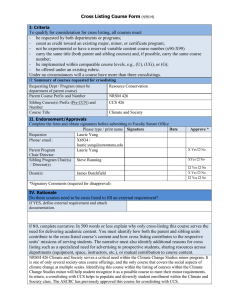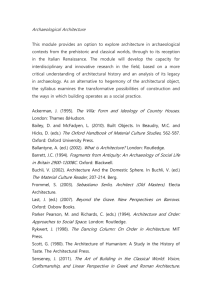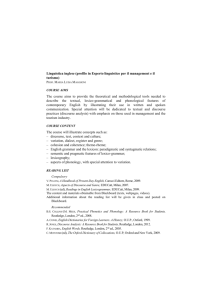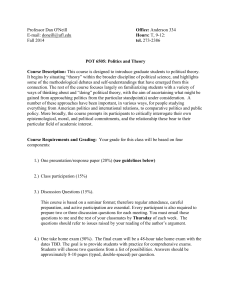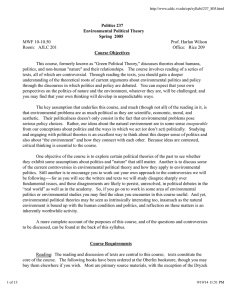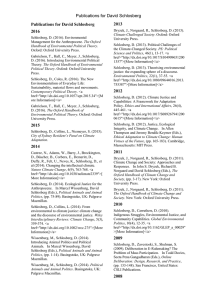General Grading and Attendance Policies
advertisement
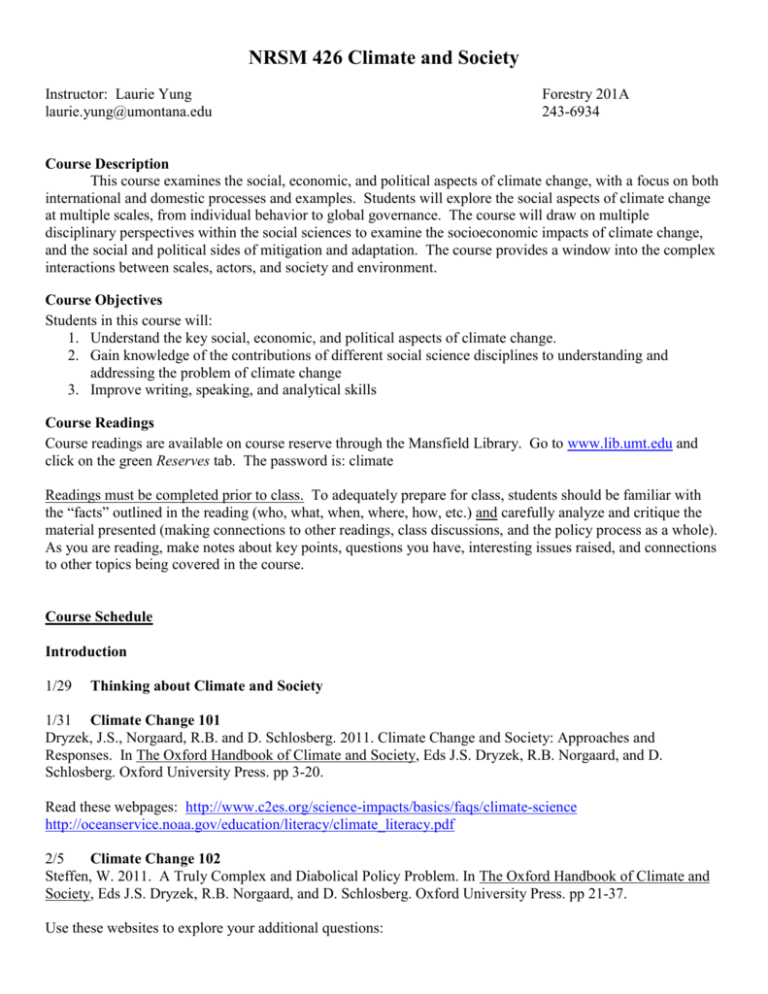
NRSM 426 Climate and Society Instructor: Laurie Yung laurie.yung@umontana.edu Forestry 201A 243-6934 Course Description This course examines the social, economic, and political aspects of climate change, with a focus on both international and domestic processes and examples. Students will explore the social aspects of climate change at multiple scales, from individual behavior to global governance. The course will draw on multiple disciplinary perspectives within the social sciences to examine the socioeconomic impacts of climate change, and the social and political sides of mitigation and adaptation. The course provides a window into the complex interactions between scales, actors, and society and environment. Course Objectives Students in this course will: 1. Understand the key social, economic, and political aspects of climate change. 2. Gain knowledge of the contributions of different social science disciplines to understanding and addressing the problem of climate change 3. Improve writing, speaking, and analytical skills Course Readings Course readings are available on course reserve through the Mansfield Library. Go to www.lib.umt.edu and click on the green Reserves tab. The password is: climate Readings must be completed prior to class. To adequately prepare for class, students should be familiar with the “facts” outlined in the reading (who, what, when, where, how, etc.) and carefully analyze and critique the material presented (making connections to other readings, class discussions, and the policy process as a whole). As you are reading, make notes about key points, questions you have, interesting issues raised, and connections to other topics being covered in the course. Course Schedule Introduction 1/29 Thinking about Climate and Society 1/31 Climate Change 101 Dryzek, J.S., Norgaard, R.B. and D. Schlosberg. 2011. Climate Change and Society: Approaches and Responses. In The Oxford Handbook of Climate and Society, Eds J.S. Dryzek, R.B. Norgaard, and D. Schlosberg. Oxford University Press. pp 3-20. Read these webpages: http://www.c2es.org/science-impacts/basics/faqs/climate-science http://oceanservice.noaa.gov/education/literacy/climate_literacy.pdf 2/5 Climate Change 102 Steffen, W. 2011. A Truly Complex and Diabolical Policy Problem. In The Oxford Handbook of Climate and Society, Eds J.S. Dryzek, R.B. Norgaard, and D. Schlosberg. Oxford University Press. pp 21-37. Use these websites to explore your additional questions: https://www.ipcc.unibe.ch/publications/wg1-ar4/faq/wg1_faqIndex.html http://scienceblogs.com/illconsidered/2008/07/how-to-talk-to-a-sceptic/ Conceptualizing Impacts 2/7 Socioeconomic Impacts, International and Domestic Climate Change: The Social and Economic Impacts. Earthwatch Institute. pp 1-8. Drought in Eastern Africa. Encyclopedia of Earth. American Security Project. Pay Now, Pay Later: Montana Harvard Medical School. 2009. Climate Change and Health in Montana. ClimateWise. Missoula County. 2/12 Equity and Justice, Burdens and Blame Roberts, J.T. 2009. The International Dimension of Climate Justice and the Need for International Adaptation Funding. Environmental Justice 2(4):185-190. Demetriades, J. and E. Esplen. 2010. The Gender Dimensions of Poverty and Climate Change Adaptation. In Social Dimensions of Climate Change: Equity and Vulnerability in a Warming World. Eds: R. Mearns and A. Norton. Washington D.C.: The World Bank. 2/14 Vulnerability Leichenko, R., Thomas, A., and M. Barnes. 2010. Vulnerability and Adaptation to Climate Change. In Routledge Handbook of Climate and Society. Ed: C. Lever-Tracy. New York: Routledge. pgs 133-151. Eakin, H. 2008. Human Vulnerability to Global Environmental Change. Encyclopedia of Earth. 2/19 Migration, Security, and Violent Conflict Homer-Dixon, T. 2007. Terror in the Weather Forecast. The New York Times. Executive Summary. National Security and the Threat of Climate Change. 2007. Center for Naval Analyses. War and Climate Cycles. 2011. Encyclopedia of Earth. Understanding Different Views of Climate Change 2/21 Polls and Public Opinion More Say There Is Solid Evidence of Global Warming. 2012. The Pew Research Center. Cooney, C. 2010. Climate Change Perceptions. Encyclopedia of Earth. Leiserowitz, A.A. et al. 2012. Global Warming’s Six Americas in March 2012 and November 2011. Yale Project on Climate Change Communication. Leiserowitz, A.A., Maibach, E.W., Roser-Renouf, C., Smith, N. and E. Dawson. 2010. Climategate, Public Opinion, and the Loss of Trust. Working Paper. 2/26 Tribes and Climate Change Whyte, K. 2013. Justice Forward: Tribes, Adaptation, and Climate Responsibility. Climatic Change. Facing the Storm: Indian Tribes, Climate-Induced Weather Extremes, and the Future for Indian Country. 2011. National Wildlife Federation. Introduction to Indigenous Perspectives on the Changing Arctic. 2009. International Arctic Science Committee. Encyclopedia of Earth. 2/28 Evangelical Christians and Climate Change Beliefs Carr, W., Patterson, M.E., Yung, L., & Spencer, D. 2012. The Faithful Skeptics: Evangelical Religious Beliefs and Perceptions of Climate Change. Journal for the Study of Religion, Nature, and Culture 6(3):276-299. 3/5 Politics, Ideology, and Science Kahan, D., Jenkins-Smith, H. and D. Braman. 2011. Cultural Cognition of Scientific Consensus. Journal of Risk Research 14(2):147-174. 3/7 Media and Communication Boykoff, M.T. and J. Smith. 2010. Media Presentations of Climate Change. In Routledge Handbook of Climate and Society. Ed: C. Lever-Tracy. New York: Routledge. pgs 210-218. Moser, S.C. and L. Dilling. 2011. Communicating Climate Change: Closing the Science-Action Gap. In The Oxford Handbook of Climate and Society, Eds J.S. Dryzek, R.B. Norgaard, and D. Schlosberg. Oxford University Press. pgs 161-174. 3/12 TBD 3/14 Understanding Climate Change Denial WATCH: PBS FRONTLINE: Climate of Doubt, October 23, 2012 (53 minutes): http://www.pbs.org/wgbh/pages/frontline/climate-of-doubt/ Kahan, D.M., Peters, E., Wittlin, M., Slovic, P., Ouellette, L.L., Braman, D. and G. Mandel. 2012. The Polarizing Impact of Science Literacy and Numeracy on Perceived Climate Change Risks. Nature Climate Change 2: 732–735. Norgaard, K. 2011. Climate Denial: Emotion, Psychology, Culture, and Political Economy. In The Oxford Handbook of Climate and Society, Eds J.S. Dryzek, R.B. Norgaard, and D. Schlosberg. Oxford University Press. 3/19 Public Views of Ecological Change in National Parks Craig, D. and L. Yung. What Do We Know About Public Views of Rapid Environmental Change in and Conservation Goals for U.S. National Parks? A Review of Existing Literature. White Paper. 3/21 Working Ranchers, Climate Change Beliefs, and Adaptation Yung, L., Phear, N. and A. DuPont. How Working Ranchers Respond to and Negotiate Ongoing Drought in Montana. Navigating Decisions at Multiple Scales 3/26 Behavior Change I Ropke, I. 2010. Ecological Economics: Consumption Drivers and Impacts. In Routledge Handbook of Climate and Society. Ed: C. Lever-Tracy. New York: Routledge. pp 121-130. Gifford, R. 2011. The Dragons of Inaction: Psychological Barriers that Limit Climate Change Mitigation and Adaptation. American Psychologist 66(4): 290-302. 3/28 Behavior Change II Ockwell, D., O’Neill, S. and L. Whitmarsh. 2010. Behavioral Insights: Motivating Individual Emissions Cuts Through Communication. In Routledge Handbook of Climate and Society. Ed: C. Lever-Tracy. New York: Routledge. pp 341-350. 4/9 Behavior Change III Walser, M. 2010. Carbon Footprint. Encyclopedia of Earth. Complete carbon footprint exercise prior to class 4/11 Social Movements No reading today 4/16 Domestic Policy I Hahnel, R. 2010. A Climate Change Policy Primer. Z Space. Bulkekey, H. 2011. Cities and Subnational Governments. In The Oxford Handbook of Climate and Society, Eds J.S. Dryzek, R.B. Norgaard, and D. Schlosberg. Oxford University Press. Diesendorf, M. 2011. Redesigning Energy Systems. In The Oxford Handbook of Climate and Society, Eds J.S. Dryzek, R.B. Norgaard, and D. Schlosberg. Oxford University Press. 4/18 Domestic Policy II No reading today 4/23 Global Governance and International Policy I Primer on the United Nations Framework Convention on Climate Change (UNFCCC). New Zealand Youth Delegation Policy Team. 2010. Harris, R. 2011. Reconceptualizing Global Governance. In The Oxford Handbook of Climate and Society, Eds J.S. Dryzek, R.B. Norgaard, and D. Schlosberg. Oxford University Press. 4/25 Global Governance and International Policy II No reading today 4/30 Public Engagement and Geoengineering Corner, A. and N. Pidgeon. 2010. Geoengineering the Climate: The Social and Ethical Implications. Environment 52(1):24-37. New Approaches 5/2 Resilience and Systems Thinking Nelson, D.R., W.N. Adger and K. Brown. 2007. Adaptation to Environmental Change: Contributions of a Resilience Framework. Annual Review of Environment and Resources, Vol. 32:395-419. 5/7 Deliberative Transformation O’Brien, K. 2012. From Adaptation to Deliberative Transformation. Progress in Human Geography. 5/9 Alternative Futures: New Forms of Capitalism, New Lifestyles Klein, N. 2011. Capitalism versus the Climate. The Nation. Leahy, T. 2010. Alternative Scenarios: Technological Optimism or Low Energy Futures. In Routledge Handbook of Climate and Society. Ed: C. Lever-Tracy. New York: Routledge. pp 280-296. 5/13 Research papers due by 5:00 pm 5/15 Finals week meeting 1:10-3:10 Student presentations Evaluation Assignment Participation In-class response essays Research paper Short presentation Percentage of Final Grade 10% 30% 40% 20% Participation Students are expected to take an active role in their education in this course, and course grades will be based, in part, on student participation. Participation includes attendance, punctuality, attentiveness, effort, and being prepared for class (having completed any assignments, including the reading for that day). Participation also means offering one's thoughts, ideas, opinions, and questions during class. There will be frequent opportunities for discussion during class, providing time for you to explore the complexity of social processes and, in particular, work on issues you find confusing. Your participation grade is not based on knowing the "right" answers or the quantity or length of your comments (in fact, concise and succinct comments, where appropriate, are favorable), but rather on your willingness to contribute, evidence that you have completed and thought through material presented in the reading, and the quality of your contributions. In addition to talking in class, participation includes respect for differing opinions. Students who arrive late, miss class, fail to do readings on time, and/or do not engage in class discussions will be penalized. In-Class Response Essays Throughout the semester, students will be asked to respond to course material (readings, films, lectures) through short in-class essays. Essays must demonstrate a basic understanding of the material and thoughtful analysis of the key issues. Research Paper Students will be required to write a research paper on a topic relevant to the course. Papers need to focus on a relatively specific topic (e.g. wind energy development on tribal lands, small island adaptation to sea level rise, what motivates people to take public transportation, China and India in international climate change negotiations). Drafts are due on March 28th. Drafts will not be graded, but you will receive feedback to improve your final paper. Final papers are due on May 13th by 5:00 pm (please feel free to email them to me). Research papers must be clearly written, utilize evidence to support arguments/assertions, and provide a thoughtful, detailed analysis of the topic. Papers should be 8-10 pages long, 12 point font, double-spaced. Intext citations (e.g. the last name of the author and the year of the publication in parentheses) and a bibliography must be used (you may use any standard format for your bibliography, just be consistent). Be sure to use quotation marks for any direct quotes from publications (you need to paraphrase and cite ideas that come from publications; you need to use quotation marks and cites for direct quotes from publications). Be sure to briefly introduce your topic/issue and spend the bulk of your paper on a detailed analysis of that topic, supporting your argument/claims with evidence from publications or other materials. Evidence can include results from scientific studies, quotes from politicians, the public, and others, historical information, anecdotes and examples, etc. To produce a high quality paper (an A paper), you will need to: Spend time in the literature, reading articles, reports, and other documents on your topic. Carefully outline an argument/flow of ideas for your paper. Write clearly! Support your arguments/claims with evidence (and citations). Provide your own insights and analysis. Short Presentation Students will be required to provide a 5-minute presentation on their research paper topic on May 15th. This presentation must be clear and concise and convey the key points of their analysis. You will not have time to use powerpoint, but you are welcome (but not required) to provide a handout for the class. Be sure to focus on your key points and practice to ensure that you do not exceed the 5 minute limit. General Grading and Attendance Policies Because your presence in class has an important affect on your learning, attendance will be recorded and counted toward your participation grade. There will be no penalty for missing three class periods. Missing more than three class periods will affect your grade. If you have an emergency that interferes with attendance, please let me know and I will take the circumstances into account (but please know that I may ask for documentation). If you miss class at any time, you are responsible for inquiring about any missed in-class essays. Late research papers will be accepted, but your grade will be lowered at least one letter grade (and potentially more depending on your circumstances and how late the paper is – bottom line: if you are late with your research paper, you should still turn it in, but get it to me as soon as possible). Please note that this class is offered for traditional letter grade only; it is not offered under the credit/no credit option. All students must practice academic honesty. Academic misconduct is subject to an academic penalty by the course instructor and/or a disciplinary sanction by the University. All students need to be familiar with the Student Conduct Code. The Code is available for review online at: http://life.umt.edu/vpsa/student_conduct.php. Grading Scale Final course grades will be determined based on the following scale: 93-100 A 90-92 A88-89 B+ 83-87 B 80-82 B78-79 C+ 73-77 C 70-72 C68-69 D+ 63-67 D 60-62 D59F Important Deadlines for Changing Course Options February 5 Last day for students to Add classes via CyberBear without consent of instructor. February 6 Beginning today all class registration adds must be done via the Override Form or and Electronic Override done through February 15 February 16-April 8 (45th instructional day) April 9-May 10 CyberBear. Consent of instructor is required. Last day to withdraw from the semester (drop all courses) with a partial refund. Last day to change grading option to or from audit. Last day to Buy or Refuse health insurance coverage or add clinical health fee. Dropping a course requires a drop/add form with instructor and advisor signature. There is a 10$ fee at registrar’s office. At this point in the semester students are only allowed to drop a class under very limited and unusual circumstances. Not doing well in the class, deciding you are concerned about how the class grade might affect your GPA, deciding you did not want to take the class after all, or deciding you want to change majors are not among those limited and unusual circumstances. If you want to drop a class for these sorts of reasons, make sure you do so before April 8.
